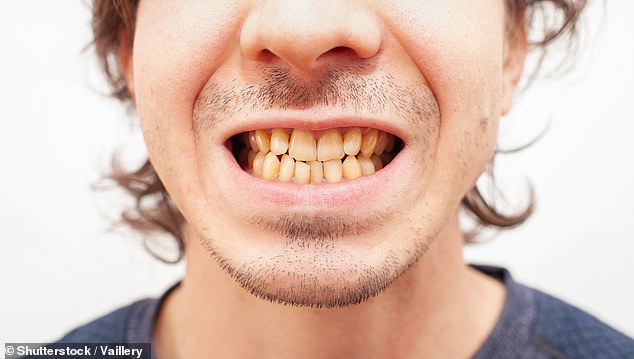A dentist has revealed the two common teeth brushing mistakes that could lead to you suffering from yellow teeth.
Dentist Ferakh Hamid, of Aesthetique Dental Care in Leeds, said people make two easily correctable mistakes when it comes to yellowing teeth.
The first was that some people choose not to wet the toothbrush before brushing, believing that doing so would help remove unsightly stains.
But Dr Hamid said so-called ‘dry brushing’ could make teeth look duller and therefore more yellow.
“Before you start brushing, it’s a good idea to wet your toothbrush. This small step makes it easier to spread the toothpaste all over your teeth, making the cleaning more effective,” he said.
Dentist Ferakh Hamid, of Aesthetique Dental Care in Leeds, said Britons were making two easily correctable mistakes when it came to yellowing teeth
“Dry brushing may seem good for getting rid of surface stains, but without water, the toothpaste doesn’t spread well, resulting in dull teeth.”
He said the second mistake Brits make is brushing too soon after drinking acidic drinks.
Acidic drinks such as fruit juice, wine and sugary and carbonated soft drinks and foods such as oranges and grapefruit can weaken tooth enamel.
And Dr Hamid explained that brushing while the enamel is weakened could lead to more yellow teeth.
Brushing too soon after eating acidic foods can wear down your tooth enamel,” she said.
This exposes the yellower layer underneath and makes your teeth appear more yellow.
“To avoid this, it’s best to wait a while after eating acidic foods before brushing, ensuring your enamel stays strong and your teeth stay healthy.”
Many dentists recommend waiting at least an hour after eating acidic foods and drinks before brushing to allow the enamel to recover.
Dr Hamid’s comments come just days after another dentist warned of the dangers of using whitening toothpaste.
In a viral video that has now been viewed more than 2 million times, the oral health expert told his TikTok followers thatToothpastes “don’t really whiten your teeth.”
While they can make your smile appear whiter at first by removing darker enamel, over time, abrasive ingredients lead to thinner, yellower and more sensitive teeth, he said.
This is because erosion of the tooth’s protective enamel exposes the dentin – the main part of the tooth that has a yellow tint.
It comes as Britons continue to struggle to access affordable NHS subsidized dental care.
The latest official figures show that just 40 per cent of adults in England have visited an NHS dentist in the last two years since June this year.
That compares to nearly 50 percent at the end of 2019, just before the Covid pandemic forced many dentists to temporarily close their doors as the nation went into lockdown.
For children, who have free access to NHS dental care, the proportion of those who visited an NHS dentist in 12 months fell to 56 per cent in June this year. That’s down from nearly 60 percent before the pandemic.
NHS dental attendance figures for both adults and children have plunged off a cliff during the Covid pandemic as practices closed as part of quarantine rules and stopped offering treatments.
But it failed to recover, despite the pandemic’s darkest days being in the past.
Industry experts suggest this is because offering NHS treatment is not as profitable as private.
Old NHS contracts for dentists paid them for batches of work carried out rather than individual treatments, no matter how complex a particular case might be.
In practice, this meant that NHS dentists were paid the same for treating a patient who needed 10 fillings as for a patient who needed just one.
This resulted in dentists losing money treating some NHS patients as the money they were being paid did not cover the cost of the procedure.
While this contact has now been reformed, the British Dental Association (BDA) estimates that thousands of NHS dentists have left or greatly reduced their NHS work following the pandemic.
The crisis is compounded by the fact that as more dentists quit or drastically reduce their work in the NHS, those still at risk are being overwhelmed.
A post-pandemic BDA survey of dentists in 2022 found that three-quarters were experiencing burnout, feeling unable to spend enough time with their patients to give them the care they needed.
And, as with the GP appointment crisis, as patients struggle to gain access, frustrations can boil over.
The same BDA survey found that 86 per cent of dentists said their practice had been physically or verbally abused by patients.
The crisis in NHS dental appointments has led to a growing number of Britons heading abroad for treatment or even carrying out gruesome dental procedures at home using tools such as pliers, as they cannot afford private care in the UK.

